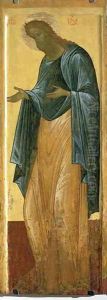(circle of) Rublev, Andrei Paintings
Andrei Rublev, considered the greatest medieval Russian painter of Orthodox icons and frescoes, was born in the 1360s, although the exact date and place of his birth are not known. His name is associated with the spiritual and artistic flowering of the Russian Middle Ages. The first historical record of Rublev dates from 1405, as working on the frescoes of the Annunciation Cathedral of the Moscow Kremlin, in collaboration with Theophanes the Greek, another prominent painter of the time.
Rublev's most famous work, the Icon of the Trinity (also known as The Hospitality of Abraham), is a masterpiece of the highest order and reflects a unique and profoundly spiritual interpretation of the Biblical story. Created sometime between 1408 and 1425, this icon is celebrated for its harmony, composition, and the tender emotion it conveys, and it has since become a symbol of Russian art. The icon is currently held in the Tretyakov Gallery in Moscow.
Rublev's art was characterized by its serene spirituality and an absence of corporeal suffering and emotional distress. His works are noted for their peaceful and harmonious compositions and soft color palettes. Rublev's influence on Russian art has been profound and enduring, with his aesthetic principles and iconography continuing to inform the Orthodox artistic tradition.
Despite his significance, details of Rublev's life and career remain sparse. It is believed that he took monastic vows and that he spent his last years at the Andronikov Monastery in Moscow, where he passed away in 1427 or 1430. In 1988, the Russian Orthodox Church canonized Rublev for his contributions to Russian religious art, and his feast day is celebrated on January 29 (which corresponds to January 17 in the Julian Calendar).
Due to the lack of extensive historical records, Rublev's biography is often based on the analysis of his surviving works and the few historical mentions of his name. The attribution of some icons to Rublev and his school has been the subject of scholarly debate, with only a handful of works being universally accepted as his. Nonetheless, Andrei Rublev remains an iconic figure in Russian culture and is regarded as a key representative of the Eastern Orthodox artistic tradition.
